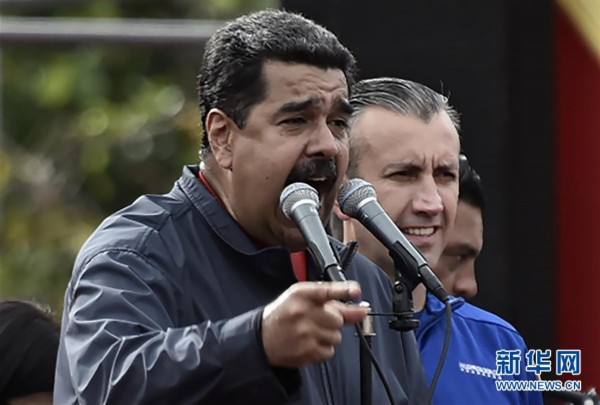Venezuela defies its enemies
- By Heiko Khoo
 0 Comment(s)
0 Comment(s) Print
Print E-mail China.org.cn, May 25, 2018
E-mail China.org.cn, May 25, 2018

On Sunday, May 20, Nicolas Maduro was reelected President of Venezuela. Maduro secured 6.2 million votes or 67.8 percent of the total vote. His main rival Henri Falcón received 1.9 million votes or 20.9 percent. However, voter turnout was only 46 percent, sharply down from the 80 percent in the previous presidential election in 2013.
The main forces of the Venezuelan opposition, grouped in the Free Venezuela Broad Front (FAVL), boycotted the election after their prolonged street campaign to dislodge Maduro by violence ended in failure. Thereafter, the electoral opposition galvanized around Falcón. Falcón was previously the elected mayor of Barquisimeto city and served as the governor of Lara state before he broke ranks with former President Hugo Chávez in 2010, citing concerns about bureaucratic and authoritarian tendencies as his justification.
The former Spanish Prime Minister Jose Luis Rodriguez Zapatero was an international monitor of Venezuela's election. He did not find the process either undemocratic or fraudulent and is seeking to encourage a dialogue between Maduro and the aggrieved opposition forces.
The Venezuelan voting system is robust. Every voter's ID is checked, then his or her thumbprints are checked, and then an electronic vote is cast. This also generates a paper copy, which is used as a double verification system. Therefore the idea that Venezuela's election was fraudulent is risible. So, why the international hue and cry over the election result? It is because the result went the wrong way from the standpoint of the right wing in South America and the interests of the United States and the European Union.
At first sight it is surprising that the opposition in Venezuela is incapable of winning greater support for change. Venezuela has suffered from several years of chaos, in which hyperinflation and shortages have crippled the everyday lives of the people, consequently many have left the country, and disillusion has penetrated the ranks of the workers and the poor, who were once staunch supporters of revolutionary reform.
The need to queue for basic goods that are in short supply, inevitably gives rise to black-markets and the manipulation of supplies by those with connections. Hyperinflation wiped out the value of savings and alienated the middle classes and small businesses; nevertheless, hyperinflation can also help to pay off a mortgage quickly. So, throughout the recent period of chaos there have been winners and losers, indeed, many people experienced both consequences.
Voting according to such personal benefits or losses in chaotic times produces a skeptical and cynical mindset. Despite this, the core of the vote for Maduro still comes from those who evaluate the whole course of the revolutionary process since 1999, when Chávez first became president.
It is certainly true that the Venezuelan revolution suffered sharp setbacks after the death of Chávez in 2013. Chávez initiated and incarnated the so-called Bolivarian revolution. He was capable of bold and dramatic shifts in orientation based on assimilating the ideas, attitudes and initiatives of the masses and analyzing global trends. His flexibility enabled him to encapsulate and express the moods of the masses and to channel government policies in a progressive direction.
Venezuela's huge oil reserves allowed Chávez to initiate bold social measures that improved the lives of the people; in healthcare, women's rights, education, welfare, land rights, indigenous rights, housing, fishing rights etc. These radical reforms consolidated the electoral base of the Chávista movement, which forged the United Socialist Party of Venezuela in 2007 to represent its socialist objectives in a political form.
The dramatic fall in the electoral turnout this year, reveals the need to revitalize the revolutionary spirit. Anti-corruption should be elevated to a major priority within the ruling party and the state bureaucracy, in order to stamp out black market manipulation of the economy and reawaken popular enthusiasm.
The economic crisis is partially ameliorated by state hand-outs but everyday life has become extremely difficult. Venezuela's capitalist class has had every opportunity to express its views in the media and through political activity. They repeatedly organized the enraged middle class in street mobilizations to bring down the government but they have never won enough support to present a viable alternative leadership.
The Venezuelan revolution has experienced tremendous advances and severe setbacks over the past two decades: it survived a U.S. backed coup-d'état in 2004, it won multiple elections at a local and national level and provided vital support for Cuba that helped to sustain its revolution during difficult times.
Venezuela inspired a wave of leftist victories in central and South America. This process is not over. In July, Mexico goes to the polls to elect a new president, the front-runner is López Obrador, a man who is very much cast in the mould of Hugo Chávez. In the long-term struggle for socialism, defending past victories and learning from them is just as important as winning new battles.
Heiko Khoo is a columnist with China.org.cn. For more information please visit:http://china.org.cn/opinion/heikokhoo.htm
Opinion articles reflect the views of their authors, not necessarily those of China.org.cn.





